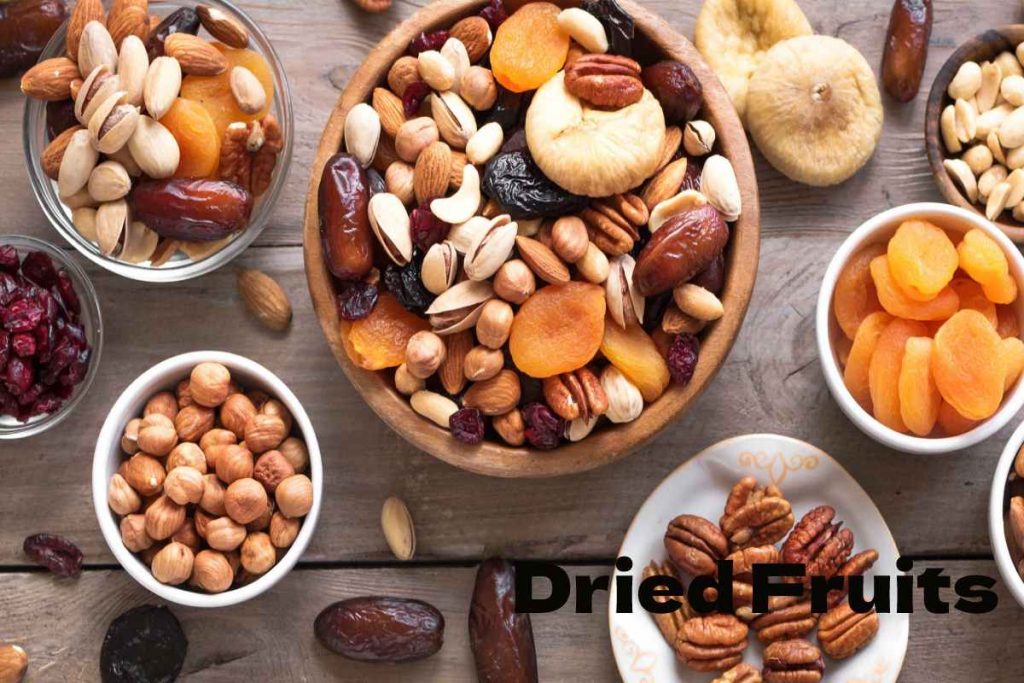Table of Contents
Definition
Dried fruits have been dried from the majority of their water content, leaving the fruit dry and shrinking, but at the same time rich in nutritional values and calories!
Here are the highlights of the benefits of dried fruits:
Benefits of Dried Fruits
One study found that people who eat dried fruits moderately and regularly in their diet often weigh less, and their bodies are better able to absorb nutrients.
The following are the potential benefits of them:
Raisin Benefits
Raisins are dried grapes and are particularly rich in potassium and fiber, and its potential benefits are that it helps:
Lowering blood pressure.
Reduce blood sugar level.
Improve cholesterol levels in the body.
Increase satiety and inhibit appetite.
Dropping the chances of developing type 2 diabetes.
Reduce the chances of heart disease.
Benefits of Dried Plum
Dried plums are rich in nutrients, fiber, potassium, beta-carotene, and vitamin k.
These are some of the potential benefits of dried Plums:
Dried plums are known for their purgative properties of the intestines due to their richness in fiber, a particular type of sugar.
Anti-constipation, some researchers even suggest that its benefits outweigh many other natural constipation prescriptions.
Reduce the chances of heart disease due to its high antioxidant content.
Reduce the chances of cancer as a result of its high antioxidant content.
Fight osteoporosis because it contains boron.
It helps you feel full and doesn’t cause high blood sugar levels.
The Benefits of Dates
Dates are an amazing source of iron, potassium (k), and fiber, and dates have the benefits:
Eating dates in a moderate amount does not cause significantly high blood sugar levels.
Eating dates regularly in the last few weeks of pregnancy facilitates normal delivery and reduces the need to stimulate childbirth.
It was heavily antioxidant-insecticide.
Eating dates help treat infertility in men, but studies are still in their infancy.
Common Dried Fruits
After learning about the types of dried fruits, it is crucial to know the most prominent types which include:
Raisins.
Dates.
Plum.
Figs.
Apricots.
Other Types are Dried with Sugar Added to them, Such as
Mango
Pineapple.
Apples.
Bananas.
Sugar in Dried Fruits
After knowing the benefits of dried fruits, it is crucial to know the sugar content of dry fruits containing a large amount of natural sugar. These are sugar ratios in different types of dried fruits:
Most of these sugars are fructose, of which eating large amounts of them may cause some damage, such as:
Weight gain.
Type 2 diabetes.
Heart disease.
Types you Should Avoid from Dried Fruits
After knowing the benefits of dry fruits, it is essential to know what types of fruits you should avoid? the answer is as follows:
Covered with sugar or dried using sugar.
Looking strangely glamorous and colorful, these are often added to color-enhancing chemicals, so choose dried brown or slightly pale fruits.
Damage to Dried Fruits Includes
Sulfur dioxide may be added to enhance its color during the production of dry fruits, which can cause people with chronic breathing problems to have asthma attacks or bronchitis.
Fruits lose the vitamin c in them during the drying process, where they decompose.
Dried fruits are high in calories for their weight, with 5-7 times the amount of calories found in fresh fruits, for example:
Dried apricots contain 238 calories per 100 grams.
Fresh apricots contain only 48 calories per 100 grams.
Tips to Make the Most of Dried Fruits
The best consumption of them is one that takes into account the quality of dry fruits and the amount consumed, so preferably:
Consumption of organic fruits is any fruit that has gone through a drying process without adding preservatives.
Do not consume sweetened fruits.
Do not consume bright dry fruits, as they are fruits added to them as synthetic materials.
Consume them in moderation and as wide a variety as possible.


